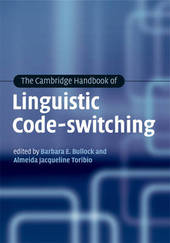
|
The Cambridge Handbook of Linguistic Code-switching
Hardback
Main Details
| Title |
The Cambridge Handbook of Linguistic Code-switching
|
| Authors and Contributors |
Edited by Barbara E. Bullock
|
|
Edited by Almeida Jacqueline Toribio
|
| Series | Cambridge Handbooks in Language and Linguistics |
|---|
| Physical Properties |
| Format:Hardback | | Pages:438 | | Dimensions(mm): Height 254,Width 177 |
|
| Category/Genre | Sociolinguistics |
|---|
| ISBN/Barcode |
9780521875912
|
| Classifications | Dewey:306.446 |
|---|
| Audience | | Professional & Vocational | |
|---|
| Illustrations |
9 Line drawings, unspecified
|
|
Publishing Details |
| Publisher |
Cambridge University Press
|
| Imprint |
Cambridge University Press
|
| Publication Date |
5 March 2009 |
| Publication Country |
United Kingdom
|
Description
Code-switching - the alternating use of two languages in the same stretch of discourse by a bilingual speaker - is a dominant topic in the study of bilingualism and a phenomenon that generates a great deal of pointed discussion in the public domain. This handbook provides the most comprehensive guide to this bilingual phenomenon to date. Drawing on empirical data from a wide range of language pairings, the leading researchers in the study of bilingualism examine the linguistic, social and cognitive implications of code-switching in up-to-date and accessible survey chapters. The Cambridge Handbook of Linguistic Code-switching will serve as a vital resource for advanced undergraduate and graduate students, as a wide-ranging overview for linguists, psychologists and speech scientists and as an informative guide for educators interested in bilingual speech practices.
Author Biography
BARBARA E. BULLOCK is Professor of Linguistics and French in the Department of French and Francophone Studies at Pennsylvania State University. ALMEIDA JACQUELINE TORIBIO is Professor of Linguistics and Spanish Linguistics in the Department of Spanish, Italian, and Portuguese at Pennsylvania State University.
Reviews'... reads like an international who's who of the field. It covers all important dimensions of code-switching, all the main theoretical frameworks, and representatives of all the major 'schools'.' Michael Clyne, University of Melbourne 'This outstanding volume brings together surveys of the major theoretical and methodological approaches to code-switching by leading scholars of sociolinguistics, psycholinguistics and neurolinguistics. ... will immediately become an essential resource and stimulus for further work by students and established scholars alike.' Carol W. Pfaff, Freie Universitat Berlin
|